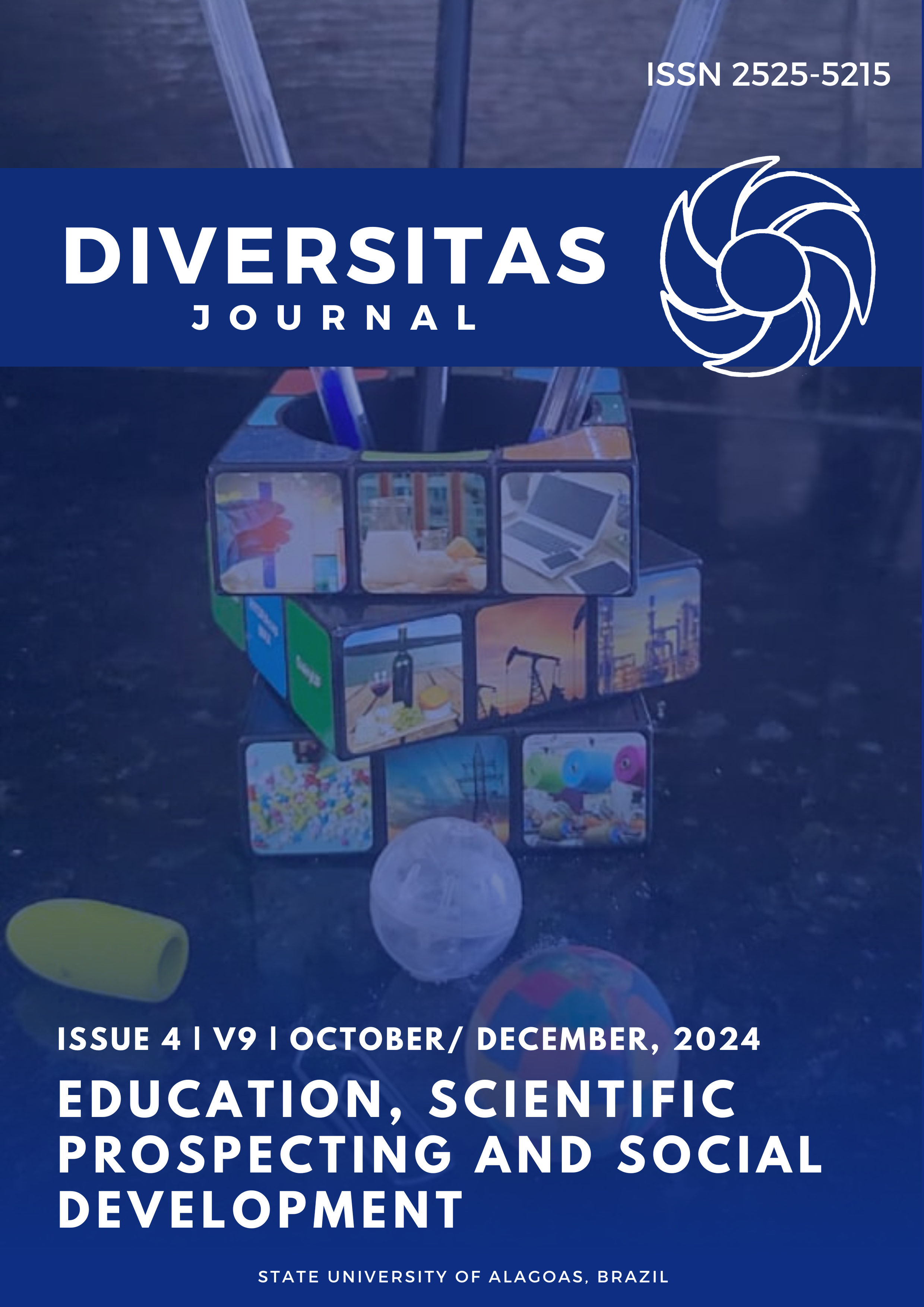Tratamento diferenciado de temas de ciência, tecnologia e sociedade no currículo de ciências do ensino médio das Filipinas
DOI:
https://doi.org/10.48017/dj.v9i4.3132Keywords:
science textbooks, science teachers, human health and diseases, air quality and the atmosphereAbstract
Curriculum planners contend that the Science-Technology-Society (STS) Approach in Science instruction is one pedagogical practice leading to students' scientific literacy development - the overarching goal of science education. This study assessed the treatment of STS themes in the Junior High School (JHS) science curriculum, as reflected in textbooks and practiced by science teachers. Twelve textbooks (from two commercial publishers and the State Textbook Bureau) were analyzed for their treatment of 12 STS themes. STS-related key concepts, terms, and illustrations were the units of analysis. Meanwhile, the teachers' treatment was assessed through self - and student assessment. Results showed that, as a whole, the STS themes emphasized in the textbooks and by the science teachers were consistent. The two STS themes most emphasized are "Human Health and Diseases" and "Air Quality and the Atmosphere." Conversely, "Nuclear Reactors" and "War Technology" are the topics least covered. There was a differential treatment of the STS themes in the three textbooks regarding the STS-related key concepts, keywords, and illustrations. The same differential treatment was observed across the four grade levels. The curriculum implementers (i.e., the science teachers) recommended proper treatments of the STS themes. Finally, a model was developed depicting the differential treatment of the STS themes in the junior high school curriculum.
Metrics
References
Ackay, H., & Yager, R. (2010). Implementing Science-Technology-Society approaches in middle school science teaching. Science Education Review, 9(3). https://files.eric.ed.gov/fulltext/EJ925480.pdf
Amirshokoohi, A. (2016). Impact of STS issue-oriented instruction on pre-service elementary teachers' views and perceptions of science, technology, and society. International Journal of Environmental & Science Education, 11(4), 359-387. https://files.eric.ed.gov/fulltext/EJ1094628.pdf
Bansiong, A. J. (2019). Readability, content, and mechanical feature analysis of selected commercial science textbooks intended for third-grade Filipino learners. Cogent Education, 6(1), 1706395.
Behnke, Y. (2018). Textbook Effects and Efficacy. The Palgrave Handbook of Textbook Studies, pp. 383–398. https://www.researchgate.net/publication/322386639_Textbook_Effects and_Efficy
Cakici, Y. (2012). Exploring Turkish upper primary level science textbooks’ coverage of scientific literacy themes. Eurasian Journal of Educational Research, 49, 81-102. https://files.eric.ed.gov/fulltext/EJ1059923.pdf
Chiapetta, E. L., Ganesh, T. G., Lee, Y. H., & Phillips, M. C. (2006). Examination of science textbook analysis research conducted on textbooks published over the past 100 years in the United States. In the annual meeting of the National Association for Research in Science Teaching, San Francisco, CA.
Dancey C., & Reidy J. (2004) Statistics Without Maths for Psychology: UsingSPSS for Windows. London: Prentice Hall
Department of Education. (2016). K to 12 Curriculum Guide Science. https://www.deped.gov.ph/wp-content/uploads/2019/01/Science-CG_with-tagged-sci-equipment_revised.pdf
Fadhli, F. A. (2000). The inclusion of Science Technology Society topics in junior high school earth science textbooks. University of Missouri-Columbia.
Fortus, D., Lin, J., Neumann, K., & Sadler, T. D. (2022). The role of affect in science literacy for all. International Journal of Science Education, 1-21. https://doi.org/10.1080/09500693.2022.2036384
Mahroof, A. & Saeed, M. (2021) Alignment between Curriculum, Textbook and Board of Intermediate and Secondary Education Question Papers of English at Secondary Level. Open Access Library Journal, 8, 1-9. doi: 10.4236/oalib.1107282.
Mai, M. Y., Halim, L., Yaseen, R. M., & Meera, T. S. M. (2012). The Ranking of Science, Technology and Society (STS) Issues by Students and Physics Teachers in Secondary School, Yemen. International Journal of Quality Assurance in Engineering and Technology Education, 2(1), 46-62. DOI:10.4018/ijqaete.2012010104
Rudolph, J. L., & Horibe, S. (2016). What do we mean by science education for civic engagement?. Journal of Research in Science Teaching, 53(6), 805-820. https://doi.org/10.1002/tea.21303
Scott, T., & Husain, F. N. (2021). Textbook Reliance: Traditional Curriculum Dependence Is Symptomatic of a Larger Educational Problem. Journal of Educational Issues, 7(1), 233-248. https://doi.org/10.5296/jei.v7i1.18447
Snow, C. E. & Dibner, K.A. (2016). Scientific literacy concepts, context, and consequences. Washington (DC): National Academies Press. Available from: https://www.ncbi.nlm.nih.gov/books/NBK396088/
Stern, L., & Roseman, J. E. (2004). Can Middle-School Science Textbooks Help Students Learn Important Ideas? Findings from Project 2061’s Curriculum Evaluation Study: Life Science. Journal of Research in Science Teaching, 41(6), 538-568. https://doi.org/10.1002/tea.20019
Trowbridge, L. W., Bybee, R. W., & Powell, J. C. (2000). Teaching Secondary School Science. New Jersey, Person, Education, Inc.
Yoho, R. A., & Rittmann, B. E. (2018). Climate change and energy technologies in undergraduate introductory science textbooks. Environmental Communication, 12(6), 731-743. https://doi.org/10.1080/17524032.2018.1454337
Downloads
Published
How to Cite
Issue
Section
License
Copyright (c) 2024 Apler Bansiong, Rosemarie F Ocampo, Eartha Mae V. Caluza, Marife B. Rillera

This work is licensed under a Creative Commons Attribution 4.0 International License.
The Diversitas Journal expresses that the articles are the sole responsibility of the Authors, who are familiar with Brazilian and international legislation.
Articles are peer-reviewed and care should be taken to warn of the possible incidence of plagiarism. However, plagiarism is an indisputable action by the authors.
The violation of copyright is a crime, provided for in article 184 of the Brazilian Penal Code: “Art. 184 Violating copyright and related rights: Penalty - detention, from 3 (three) months to 1 (one) year, or fine. § 1 If the violation consists of total or partial reproduction, for the purpose of direct or indirect profit, by any means or process, of intellectual work, interpretation, performance or phonogram, without the express authorization of the author, the performer, the producer , as the case may be, or whoever represents them: Penalty - imprisonment, from 2 (two) to 4 (four) years, and a fine. ”


















